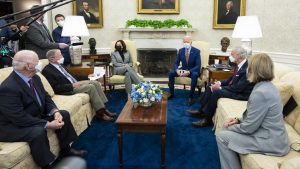News
Building A Big Infrastructure Plan, Biden Starts With A Bridge To Republicans
By: Mara Liasson | NPR
Posted on:
WASHINGTON, D.C. (NPR) — President Biden is continuing his victory lap this week after passing the $1.9 trillion COVID-19 relief bill, which addressed the most immediate crises Biden has faced coming into office: a pandemic still spreading and an economy still millions of jobs short of where it was a year ago.

“The Build Back Better bill is the legacy bill,” said Bill Galston, former domestic policy adviser in the Clinton White House. “It’s the bill that will define the meaning of the Biden presidency.”
White House aides are reportedly compiling a $3 trillion plan that would include a wide range of priorities, including social programs and tax changes, though press secretary Jen Psaki said on Monday that nothing was decided: “President Biden and his team are considering a range of potential options for how to invest in working families and reform our tax code so it rewards work, not wealth.”
This is going to be an infrastructure bill that goes far beyond roads and bridges. It’s designed to be a major investment in manufacturing and the technologies of the future, including 5G, a green electric grid, universal broadband Internet access, semiconductor production and carbon-free transportation.
Galston says it’s a bill that could transform the country: “A country that has not invested in itself for a very long time. A country that is on the verge of losing its technological and economic superiority to the rising power at the other side of the Pacific.”
That means China. Outcompeting Beijing is something that both parties agree on, and it’s at the heart of Biden’s sales pitch for the Build Back Better agenda.
“If we don’t get moving, they are going to eat our lunch,” Biden said at a bipartisan meeting of senators in the Oval Office last month, the day after he spoke with Chinese President Xi Jinping.
But Biden has a number of decisions to make about how to get that plan moving, such as how and whether to pay for what will be a multitrillion-dollar investment, what pieces of the plan should be introduced first and whether it’s possible to get Republican votes, something Biden failed to do on the pandemic relief bill.
“The big question is whether the strategy for passing the COVID-19 bill is a template or whether it’s an exception,” Galston said.
To pass the COVID-19 relief bill, the White House came up with its plan – a $1.9 trillion package. Then the Republicans came back with a much smaller offer at $681 billion. There were a few bipartisan discussions, but the gap was too big to bridge, so in the end the bill passed with no Republican support at all.
To pass Build Back Better, the White House is trying a different approach, inviting Republicans in on the ground floor to craft the legislation. There have already been bipartisan meetings at the White House and in the Senate. In the House, Speaker Nancy Pelosi has instructed her Democratic committee chairs to work with their Republican counterparts to develop infrastructure legislation.
That would be kind of old-fashioned, but there’s no one more enamored of old-fashioned bipartisan buy-in than Joe Biden. That was clear after one of those bipartisan infrastructure meetings at the White House last month.
“It’s the best meeting I think we’ve had so far,” the president said. “It was like the old days — people are actually on the same page,” he added.
The latest thinking among Democrats is that there are pieces of an infrastructure agenda that could be broken off and passed as smaller individual bills with GOP votes, including things like universal broadband and anything that confronts China through investments in manufacturing or intellectual property protection.

“The notion is we could get together there because Republicans and Democrats both believe our infrastructure needs help. It’s crumbling. It will help the economy if done right,” said Ohio Republican Sen. Rob Portman on Fox News. “My concern is once again they’re going to ignore the Republicans as they did this time around.”
Democrats hear that and think Republicans will do what they did to President Obama — refuse to compromise, then attack the president for failing to get them to compromise. Republicans do not have a lot of political incentives to compromise with Biden, and it’s possible that the relationship between the two parties on Capitol Hill is just too broken for bipartisanship. Especially after Jan. 6, when a majority of Republicans voted to overturn the 2020 election, neither side thinks the other is acting in good faith.
In the White House, bipartisanship is seen as something to strive for — it’s part of Biden’s political DNA. But in the end, as long as voters see that Biden tried hard to work across the aisle, achieving bipartisan success is not seen as a political necessity.
“The only thing that bipartisanship really buys you is some protection against the inevitable screw-ups,” said Elaine Kamarck, a former Clinton White House aide and author of Why Presidents Fail. “The process of implementation, particularly on big big projects like this, there are hiccups in it. Obviously, if it’s bipartisan you weather those hiccups better than you do if you’ve only passed it with one party. In the end, it doesn’t really matter that much as long as it gets implemented.”
In other words, the process isn’t as important to voters as the product. Whether it’s vaccines, school openings or infrastructure jobs, the idea is that voters just want Biden to deliver.
But that might be a misread of the politics, according to Galston, who thinks getting Republican votes is a political necessity for Biden because of his promises in the campaign: “That he could work harder than his predecessors did to restore the ability of the two parties, not only to talk to each other civilly, but also to work together.”
Galston thinks that promise really mattered to swing voters in the suburbs who made the difference between victory and defeat for Biden. In other words, those voters took the president’s promise of bipartisanship seriously and literally.
Biden was asked about his prediction that Republicans would see the light after the election during an interview with ABC News last week.
“They haven’t had that epiphany you said you were going to see in the campaign,” said anchor George Stephanopoulos.
“No, no, well I’ve only been here six weeks, pal, OK? Gimme a break,” Biden said before going on to talk about how popular the relief bill was with ordinary Republicans, if not GOP members of Congress.
Then Biden revealed how important those voters are to him, eventually landing on a declaration: “I won those Republican voters in suburbia.”
The president won’t be on the ballot in 2022, but his agenda will be. Democrats need to do better with those Republican voters in suburbia if they are to hang on to their tiny majorities in both houses of Congress. How Biden goes about passing his next big proposal may determine whether his party wins them or not.
9(MDI4ODU1ODA1MDE0ODA3MTMyMDY2MTJiNQ000))


